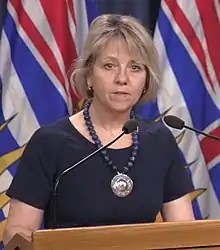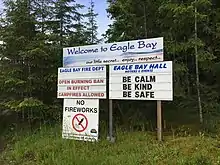Bonnie Henry
Bonnie Henry FRCPC (born 1965 or 1966)[2] is a Canadian physician who is the Provincial Health Officer for British Columbia, the first woman in this position. Henry is also a clinical associate professor at the University of British Columbia. She was a family doctor and is a specialist in public health and preventive medicine (also known as community medicine).
Bonnie Henry | |
|---|---|
 Henry speaks at a British Columbia COVID-19 update in 2020 | |
| Born | 1965/1966 (age 54–55) |
| Alma mater | |
| Occupation | Physician |
| Known for | Public health |
Her early handling of the COVID-19 pandemic in British Columbia earned praise from the New York Times in June of 2020 that called her "one of the most effective public health officials in the world".[3]
Early life and education
Born in Fredericton, New Brunswick, Henry grew up in Charlottetown, Prince Edward Island, where her mother, father, sister, niece, and nephew live.[4] Her father was a major in the Canadian Army; the family lived in many different locations due to his postings, including Calgary, St. John's, and the Netherlands. Henry is the second-oldest of four daughters.[2]
In 1986, Henry received a BSc (Honours) from Mount Allison University in Sackville, New Brunswick. In 1990, Henry earned an M.D. from Dalhousie University Faculty of Medicine in Halifax, Nova Scotia. From 1996 to 1999, Henry did a residency in preventive medicine at the University of California, San Diego. In 1999, she earned an MPH degree in epidemiology from San Diego State University.[5][6] In 2001, Henry completed a residency in Public Health and Preventive Medicine at the University of Toronto in Toronto, Ontario.
Career
During her third year of her medical degree at Dalhousie, Henry enlisted in the Royal Canadian Navy and served as a medical officer after graduating.[2] She was based out of CFB Esquimalt, located in Victoria, B.C. on Vancouver Island, serving for ten years.[2][7]
In the early 2000s, Henry served as part of the World Health Organization – UNICEF polio eradication programme in Pakistan.[8] She continued to work with the World Health Organization in 2001, moving to Uganda to support their efforts to tackle the Ebola virus disease.[9] Henry helped to establish the Canada Pandemic Influenza Plan, which contains recommendations for health-related activities during the spread of a virus.[10]
In September 2001, Henry joined the Toronto Public Health authority as an associate medical officer of health, where she led the Emergency Services Unit and the Communicable Disease Liaison Unit. In this capacity she was operational lead of the response to the severe acute respiratory syndrome (SARS) and Influenza A virus subtype H1N1 outbreaks in Toronto.[5][11]
From 2005 to 2007, Henry worked as a physician epidemiologist at the BC Centre for Disease Control. From 2007 to 2014, she was the medical director of Public Health Emergency Management while also working as medical director of Communicable Disease Prevention and Control starting in 2011.[5] She helped Canada to plan and police the 2010 Winter Olympics.[11][12]
In December 2013, Henry was made interim provincial executive medical director of the BC Centre for Disease Control.[5][13] She was made Deputy Provincial Health Officer in August 2014, a position she held for three years.[5][14] She helped to lead British Columbia through a catastrophic wildfire season, which impacted the air quality, as well as advising the Government of Canada on the Influenza A virus subtype H7N9 epidemic.[15]
In February 2018, Henry was appointed as the Provincial Health Officer for British Columbia at the British Columbia Ministry of Health, the first woman to hold the role.[5][15] She chairs the pandemic influenza task group.[16] The group looks to minimise the number of people who become seriously ill during a pandemic, as well as limiting the social disruptions.[16] She called for more efficient electronic systems to understand vaccine uptake, as well as manage Canada's vaccine inventory.[16]
Henry has taught at the UBC School of Population and Public Health, Faculty of Medicine since 2010, where she is an associate professor.
COVID-19 response

Henry leads the provincial government's response to the COVID-19 pandemic in British Columbia.[17][18]
First half 2020
On 30 January 2020, following confirmation of the first infected person in British Columbia, Henry advised the public that "It is not necessary for the general public to take special precautions beyond the usual measures recommended to prevent other common respiratory viruses during the winter period."[19] In March medical columnist for The Globe and Mail described her as "a calming voice in a sea of coronavirus madness".[20] In June Henry was featured in a New York Times article titled "The Top Doctor Who Aced the Coronavirus Test", praising the way that she has handled the COVID-19 pandemic.[3]
Second half 2020
A limited edition Compass card featuring the quote from Henry, "Be Kind, Be Calm, Be Safe" was released by TransLink on September 15, 2020.[21] On 22 September 2020, Henry stated that she received death threats and "(has) had to have security in (her) house."[22]
On December 22nd Henry received one of the first 3,600 doses of the Pfizer–BioNTech COVID-19 vaccine, saying "It’s really my way of showing how confident we are in the vaccine and how important it is for all of us to be immunized in solidarity with (health-care workers)".[23]
Personal life
Henry lives in Victoria, British Columbia.[24] She met her husband while serving in the Royal Canadian Navy. The couple separated after 20 years of marriage.[2]
Leadership
- 2009: Canadian Pandemic Coordinating Committee responding to pandemic H1N1 influenza, Member[5]
- Canadian Public Health Measures Task Group, Chair[5]
- Canadian National Advisory Committee on Immunization, Member[5]
- Immunize Canada, Chair[5]
- Infection Control Expert Group, Member[5]
- National Infection Control Guidelines Steering Committee[5]
- Ontario SARS Scientific Advisory Committee, Executive Team Member[5]
Certifications
- 1999: American College of Preventive Medicine, Board Certification, Preventative Medicine
- 2001: Royal College of Physicians and Surgeons of Canada, Fellow, Public Health and Preventive Medicine
Selected works and publications
Selected works
Selected publications
- Poutanen, Susan M; Low, Donald E; Henry, Bonnie; Finkelstein, Sandy; Rose, David; Green, Karen; Tellier, Raymond; Draker, Ryan; Adachi, Dena; Ayers, Melissa; Chan, Adrienne K (2003). "Identification of Severe Acute Respiratory Syndrome in Canada". New England Journal of Medicine. 348 (20): 1995–2005. doi:10.1056/NEJMoa030634. ISSN 0028-4793. OCLC 4638980317. PMID 12671061.
- Svoboda, Tomislav; Henry, Bonnie; Shulman, Leslie; Kennedy, Erin; Rea, Elizabeth; Ng, Wil; Wallington, Tamara; Yaffe, Barbara; Gournis, Effie; Vicencio, Elisa; Basrur, Sheela (3 June 2004). "Public Health Measures to Control the Spread of the Severe Acute Respiratory Syndrome during the Outbreak in Toronto". New England Journal of Medicine. 350 (23): 2352–2361. doi:10.1056/nejmoa032111. ISSN 0028-4793. PMID 15175437.
- Loeb, Mark; McGeer, Allison; Henry, Bonnie; Ofner, Marianna; Rose, David; Hlywka, Tammy; Levie, Joanne; McQueen, Jane; Smith, Stephanie; Moss, Lorraine; Smith, Andrew (2004). "SARS among Critical Care Nurses, Toronto". Emerging Infectious Diseases. 10 (2): 251–255. doi:10.3201/eid1002.030838. ISSN 1080-6040. PMC 3322898. PMID 15030692.
- Basrur, Sheela V.; Yaffe, Barbara; Henry, Bonnie (2004). "SARS: A Local Public Health Perspective". Canadian Journal of Public Health. 95 (1): 22–24. doi:10.1007/BF03403628. PMC 6976208. PMID 14768736.
- Henry, B.; Gadient, S. (2017). "Canada's pandemic vaccine strategy". Canada Communicable Disease Report. 43 (7/8): 164–167. doi:10.14745/ccdr.v43i78a05. PMC 5764724. PMID 29770084.
- Henry, B. (2018). "Canadian Pandemic Influenza Preparedness: Health sector planning guidance". Canada Communicable Disease Report. 44 (1): 6–9. doi:10.14745/ccdr.v44i01a02. PMC 5937063. PMID 29770091.
References
- Former naval officer leads B.C.’s response to COVID-19 pandemic Royal Canadian Navy - Government of Canada
- Porter, Catherine (5 June 2020). "The Top Doctor Who Aced the Coronavirus Test". The New York Times. Archived from the original on June 5, 2020.
- "The Top Doctor Who Aced the Coronavirus Test". Archived from the original on 2020-06-08.
- Fraser, Sarah (4 May 2020). "Meet one of the heroes of the pandemic: B.C.'s Dr. Bonnie Henry is from P.E.I." CBC News.
- "Biographies: Dr. Bonnie Henry, Provincial Health Officer". British Columbia Ministry of Health. Archived from the original on 20 March 2020. Retrieved 7 June 2020.
- "Meet B.C.'s provincial health officer Dr. Bonnie Henry | BC Pharmacy Association". www.bcpharmacy.ca. Archived from the original on 2020-03-20. Retrieved 2020-03-20.
- D'Souza, Jason (15 April 2020). "Dr. Bonnie Henry brings wealth of global experience to B.C.'s COVID-19 response". Canadian Broadcasting Corporation.
- "Bonnie Henry". National Collaborating Centre for Infectious Diseases. 2015-04-30. Archived from the original on 2020-03-20. Retrieved 2020-03-20.
- "Bonnie Henry". Canadian Science Policy Centre. 2015-12-03. Archived from the original on 2020-03-20. Retrieved 2020-03-20.
- Meissner, Dirk (2020-03-08). "Dr. Bonnie Henry, virus hunter and healer, resolves to 'break' COVID-19". British Columbia. Archived from the original on 2020-03-20. Retrieved 2020-03-20.
- "Bonnie Henry". School of Population and Public Health (SPPH). Archived from the original on 2020-03-20. Retrieved 2020-03-20.
- ""Soap and Water and Common Sense" Bonnie Henry, MD, MPH". KVMR Community Radio. Archived from the original on 2020-03-20. Retrieved 2020-03-20.
- "Bonnie Henry, MD MPH FRCPC". Virology Education. Archived from the original on 2020-03-20. Retrieved 2020-03-20.
- "Dr. Bonnie Henry appointed Deputy Provincial Health Officer of BC". School of Population and Public Health (SPPH). 2014-08-21. Archived from the original on 2020-03-20. Retrieved 2020-03-20.
- Mall, Rattan. "Dr. Bonnie Henry will be first female provincial health officer in B.C. | Indo-Canadian Voice". www.voiceonline.com. Archived from the original on 2020-03-20. Retrieved 2020-03-20.
- December 5, Elizabeth Payne Updated; 2018 (2018-12-05). "'Are we ready?': Canada and the world have work to do before next pandemic, say experts | Ottawa Citizen". Archived from the original on 2020-03-20. Retrieved 2020-03-20.CS1 maint: numeric names: authors list (link)
- "COVID-19 precautions 'not optional,' B.C.'s Dr. Bonnie Henry warns". Trail Daily Times. 2020-03-20. Archived from the original on 2020-03-20. Retrieved 2020-03-20.
- "B.C. health officials to provide Friday update on coronavirus response". Global News. Archived from the original on 2020-03-20. Retrieved 2020-03-20.
- "First coronavirus case in British Columbia confirmed". Vancouver Sun. Retrieved 6 November 2020.
- "Opinion: Bonnie Henry is a calming voice in a sea of coronavirus madness". Archived from the original on 2020-03-15. Retrieved 2020-03-20.
- "Enter to win a "Be Kind, Be Calm, Be Safe" Compass Card with a DayPass!". The Buzzer blog. 2020-09-15. Retrieved 2020-11-03.
- "B.C.'s chief health officer says she's received death threats, abuse | CBC News". CBC. CBC. 22 September 2020. Retrieved 6 November 2020.
- "Dr. Bonnie Henry receives first COVID-19 vaccine dose". Vancouver Island. 22 December 2020. Retrieved 23 December 2020.
- "Proust for Physicians. Proust Questionnaire: Dr Bonnie Henry". British Columbia Medical Journal. 60 (8): 418. October 2018.
External links
| Wikimedia Commons has media related to Bonnie Henry. |